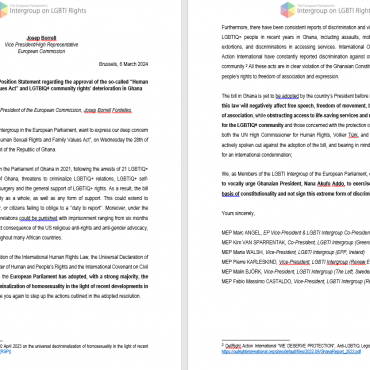Open letter to Budapest Mayor and Assembly: Don’t ban Pride
Today Members of the European Parliament sent an open letter to the mayor and parliament of Budapest, urging them to allow and protect the upcoming LGBT pride march on 7 July.
 Budapest Pride was initially allowed to march on 7 July, before the police attempted to cancel their authorisation. Similarly to last year, the Metropolitan Court of Budapest overturned the ban, and the event is due to take place.
Budapest Pride was initially allowed to march on 7 July, before the police attempted to cancel their authorisation. Similarly to last year, the Metropolitan Court of Budapest overturned the ban, and the event is due to take place.
However, Hungarian press reports indicate that councillors may be planning to adopt bylaws to “specifically and clearly target the gay pride march” (source: Origo).
Members of the European Parliament have written to István Tarlós, Mayor of Budapest, and to members of the Budapest Assembly, urging them to ensure the pride “will take place legally and peacefully, in line with shared European values.”
Read more:
- Download the full letter (English)
- Download the full letter (Hungarian)
- See the full text of the open letter below
Dear Mayor, Dear Members of the General Assembly of Budapest,
The lesbian, gay, bisexual and transgender community of Hungary is preparing for the annual Budapest Pride on 7th July. At the end of this month, the city will also host the EuroGames, a recognised European sporting event.
Pride marches are a global tradition of many decades, celebrating society’s diversity and openness towards LGBT people. They are a unique, non-violent and colourful form of protest, widely accepted across the European Union. Several Member States officially support pride marches, and some will indeed have their ambassador take part in Budapest Pride on 7th July.
Nonetheless, we have become aware of repeated attempts to ban, or indeed make more difficult, any public demonstrations of acceptance towards LGBT people—including LGBT prides. These have taken the form of legislative proposals by individual Assembly members, but have thankfully not been adopted so far.
It seems, however, that future proposals are underway to forbid using main routes, including Andrássy út, under certain conditions. These proposals appear to “specifically and clearly target the gay pride march”, according to an anonymous Councillor cited by Origo.
Whether or not pride marches are approved of, they constitute a public demand for equal rights; free and open European societies, including Hungary, have long protected and enabled them.
Two weeks ago, the European Parliament adopted a resolution on the fight against homophobia in Europe. Adopted with a large majority, the text expresses our acute concern over attempts to limit freedom of expression and assembly for those who support the rights of LGBT people. Our resolution specifically mentions earlier proposals in the General Assembly of Budapest.
Furthermore, European and international jurisprudence clearly protects the right to hold LGBT pride marches if the event satisfies public order constraints. This was upheld several times by the European Court of Human Rights (notably in Bączkowski and others v. Poland (2007) and Alexeyev v. Russia (2010)), and the International Covenant on Civil and Political Rights protects sexual orientation from discriminatory laws and practices under its Articles 2 and 26, including when it comes to freedom of expression and assembly (Art. 19 and 21).
Finally, the Committee of Ministers of the Council of Europe has recently reaffirmed the importance of these rights for LGBT people. In its Recommendation on measures to combat discrimination on grounds of sexual orientation or gender identity (CM(2010)5/Rec), Ministers agreed that “Member states should take appropriate measures to prevent restrictions on the effective enjoyment of the rights to freedom of expression and peaceful assembly resulting from the abuse of legal or administrative provisions, for example on grounds of public health, public morality and public order”.
In light of the above, we would like to reiterate our support to these events as the expression of free and democratic societies. We hope they will take place legally and peacefully, in line with shared European values. Some of us look forward to visiting Budapest on this occasion.
On behalf of the European Parliament’s Intergroup on LGBT Rights,
Yours sincerely,
Michael Cashman MEP, Co-president
Ulrike Lunacek MEP, Co-president
Sophie In’t Veld MEP, Vice-president
Raül Romeva i Rueda MEP, Vice-president
Sirpa Pietikäinen MEP, Vice-president
Dennis de Jong MEP, Vice-president





